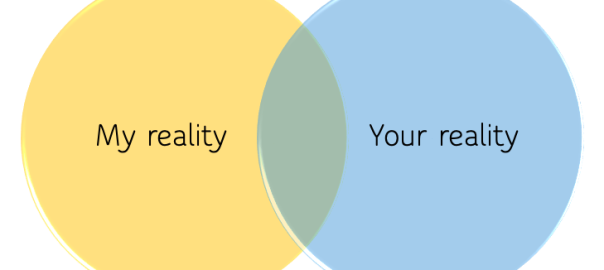The notion of agreement implies plurality: there is an inherent “more than just me” to the word because, on my own, my perspective of the world is my default setting for what is real. I don’t have to agree with myself, it is my baseline of relating to the world. However, in any interaction with someone else, there are points where we have very similar perspectives and also those where we diverge. This is not the same as having a different opinion (I think vanilla ice cream = awesome, and for you maybe raspberry sorbet = awesome), but as a more fundamental sense of what is occurring. In spending significant time with persons who are in hospice care, I have reflected a lot on what it means to be in a shared space across more than one experience of reality.
All of the people I meet in the course of volunteering have one or both of the following characteristics:
- altered sensory perception such as pronounced hearing loss, vision impairment, motor changes that impact how easily/often they move, changed proprioceptive awareness (processing their body in space), and/or
- diagnoses of dementia (often exacerbated by the challenges with sensory perception and routines of life in a facility).
These cannot be separated from one another. Each informs the other.

Example: Once while visiting a Friend, I noticed she had received mail. I opened the envelope and handed it to her. She responded, “I need my focusers.” I found her reading glasses and she accurately read the letter out loud, commenting with comprehension on things her friend had written but stopped mid-sentence when it reached the edge of the card. I turned it over for her and she continued reading. My reality and hers included knowledge of reading glasses, literacy, and social conventions in written correspondence. We both spoke in complete, grammatically intact sentences. Her reality included a creative word use and did not recall that the back of the card finished the sentence. Neither of those are a problem for me because my reality has opportunities to be flexible as a benefit of being a volunteer.

of a pair of glasses into separate, abstract spheres.
I talk about these kinds of experiences with my family intentionally and often. It is my hope that the stigma around dementia can be eased by being open about it. For that matter, I want to expand the sense of what is normal to include being with people where they are: whole.
The “Story of the Focusers” has represented a type of the interactions I regularly have. There are multiple points of agreement in a shared reality; what differences there are need not stress my version.
I have another Friend who has an insatiable drive to move, primarily to stand and walk, which is in dire contradiction to how unstable she is on her feet. I thought I had figured out a resolution by walking alongside her wheelchair, pushing it with my right hand while holding under her left hand with my left hand. She spoke in phrases that I would sometimes repeat (“your mother’s garden?”), but it didn’t seem to matter so much that there was a back-and-forth between us. When I sang, “Take me out to the ball game” she interrupted in the middle to say, “I like that.” It was a nice visit.
The next week, she’d had an extremely serious fall resulting in significant swelling and bruising on her face and hands. She was talking very quietly primarily to herself (in a way consistent with other visits), but occasionally turning her head as though she were directing what she said to someone not present to me. Even with one eye completely swollen shut, she kept reaching beyond the balance of her chair and leaning to shift around me sitting in front of her. I was amazed at her persistence and creativity. It was clear that she knew I was there insofar as I was an obstacle to her primary goal of getting up and that she was determined to solve that problem. In almost every other observable way, we held completely separate spheres of experience.
Last week, she was considerably healed from her injuries. There was a gardening magazine in front of her at the table and sometimes she turned the pages (left to right), and even directly responded to things I said. I posed, “Did your mother’s garden have flowers?” She looked at me and said, “No.” So I asked if it was vegetables, like carrots and tomatoes, and she nodded and repeated, “carrots and tomatoes”. Does that mean that there were more points of agreement in a reality we shared together? Perhaps. It honestly does not matter. I look forward to visiting with her next week, and we’ll take it from there.
End blip.
